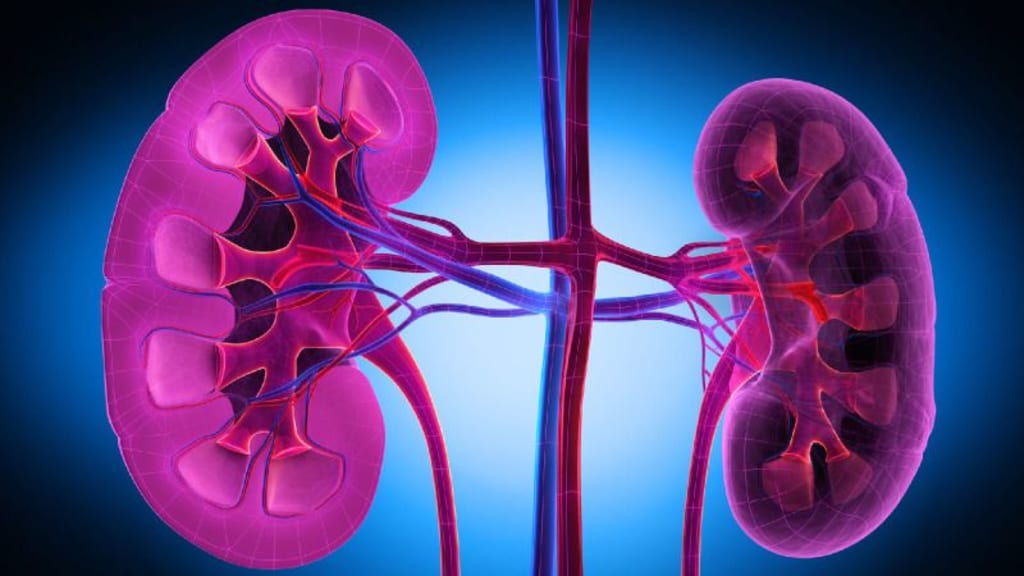Content warning
This story may contain sensitive material or discuss topics that some readers may find distressing. Reader discretion is advised. The views and opinions expressed in this story are those of the author and do not necessarily reflect the official policy or position of Vocal.
NSAID NEPHROPATHY
HOW NON-STEROIDAL ANTI-INFLAMMATORY DRUGS CAN IMPACT YOUR KIDNEYS

NSAID nephropathy is a condition characterised by kidney damage caused by the prolonged or excessive use of nonsteroidal anti-inflammatory drugs (NSAIDs), commonly used for pain and inflammation. It can lead to reduced kidney function, fluid retention, and hypertension. Monitoring and discontinuing NSAID use are essential for management.
Nonsteroidal anti-inflammatory medicines (NSAIDs) are a group of pharmaceuticals with analgesic and anti-inflammatory properties. Acute interstitial nephritis (AIN), which may be accompanied by nephrotic syndrome, papillary necrosis, electrolyte and acid-base abnormalities, hemodynamically mediated acute kidney damage (AKI), and papillary necrosis are just a few of the kidney injuries that NSAIDs can cause.
They’re frequently used to treat the following symptoms:
Headaches
Painful periods
Suspensions and strains
Flu and colds
Illnesses such as arthritis can cause long-lasting discomfort.
Types of NSAIDs
NSAIDs come in various forms, including tablets, capsules, lotions, gels, injections, and suppositories (capsules placed into the bottom). While some require a prescription, others may be purchased without one from pharmacies.
Traditional NSAIDs: These include over-the-counter medications such as ibuprofen (Advil, Motrin) and naproxen (Aleve) and prescription NSAIDs such as diclofenac and indomethacin.
Selective COX-2 Inhibitors: These NSAIDs target the COX-2 enzyme involved in inflammation and pain. Examples include celecoxib (Celebrex).
Salicylates: Aspirin (acetylsalicylic acid) is the most well-known salicylate NSAID, which also acts as a blood thinner.
Propionic Acid Derivatives: Examples include ibuprofen and naproxen.
Acetic Acid Derivatives: Examples include diclofenac (Voltaren) and indomethacin (Indocin).
Enolic Acid Derivatives: These include piroxicam (Feldene) and meloxicam (Mobic).
Fenamic Acid Derivatives: Examples include mefenamic acid (Ponstel) and meclofenamate (Meclomen).
Oxicam Derivatives: Examples include tenoxicam (Tilcotil) and lornoxicam (Xefo).
Molecular Structure of NSAIDs- Dicolfenac, Ibuprofen, Indomethacin, NaproxenMolecular Structure of NSAIDs- Dicolfenac, Ibuprofen, Indomethacin, Naproxen
How Non-Steroidal Anti-Inflammatory Drugs Can Impact Your Kidneys?
A sudden decline in kidney function characterises acute kidney injury (AKI). Although almost all NSAIDs can potentially induce AKI, renal injury brought on by NSAID usage is uncommon. Advanced age, comorbidities, and frequently used drugs contribute to a decrease in glomerular filtration rate (GFR), which raises the risk of nephrotoxicity associated with NSAID usage and speeds up the onset of adverse effects.
Arterial hypertension is one of the crucial risk factors that should be taken into account. Renin-angiotensin-aldosterone (RAA) and the sympathetic nervous system are two systems that become more active in those who have it. An increase in these systems’ activity results in vasoconstriction, which inhibits the production of prostaglandin. The compensatory process, which entails dilating the renal arteries and damage to them, is removed when the mechanism by which NSAIDs inhibit COX is added.
While NSAID-related changes do not affect blood pressure in people with normotension, they may increase blood pressure in those with hypertension and lessen the effectiveness of antihypertensive medication.
Two separate diseased entities are the root causes of the medications’ adverse renal effects. A reduction in prostaglandins, which control glomerular vasodilation, is the primary cause of acute kidney damage (AKI) by NSAIDs. Lower renal plasma flow is the initial mechanism of AKI. NSAIDs interfere with the kidney’s compensatory prostaglandin vasodilation response to the body’s vasoconstrictor hormones. Acute renal function decline following NSAID use is caused by renal prostaglandin inhibition.
Acute interstitial nephritis (AIN), characterised by the presence of inflammatory cell infiltration in the kidney interstitium, is the second mechanism of AKI. After exposure to NSAIDs for roughly a week, AIN is brought on by an immunological response.
When your back hurts, your head hurts, your arthritis flares up, or you have a fever, an NSAID can provide you the quick relief you need. They are secure when used appropriately. It is not a good idea to take them, though, if you have certain medical conditions. Ask your doctor if NSAIDs are appropriate for you.
About the Creator
Enjoyed the story? Support the Creator.
Subscribe for free to receive all their stories in your feed. You could also pledge your support or give them a one-off tip, letting them know you appreciate their work.





Comments
There are no comments for this story
Be the first to respond and start the conversation.